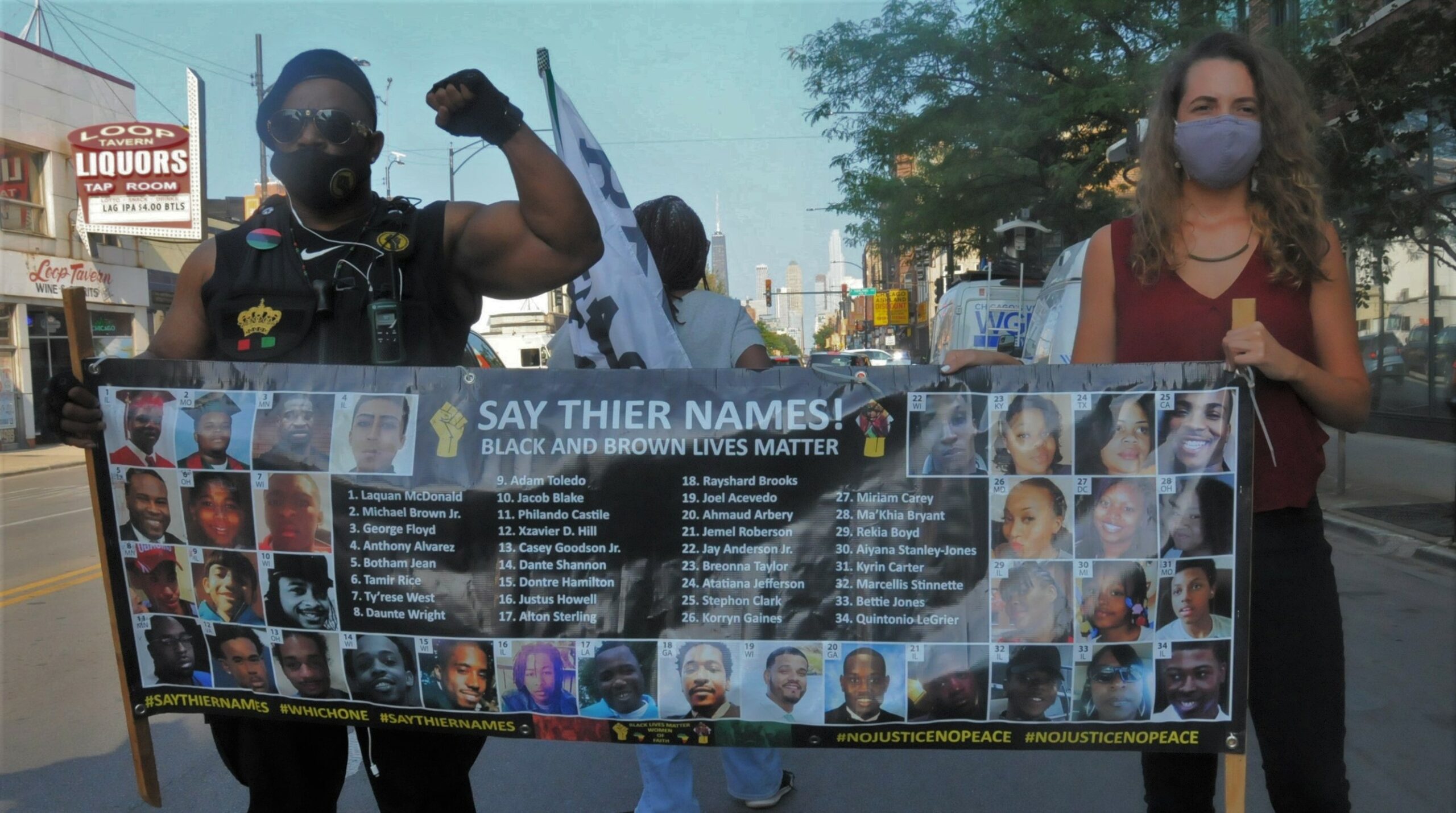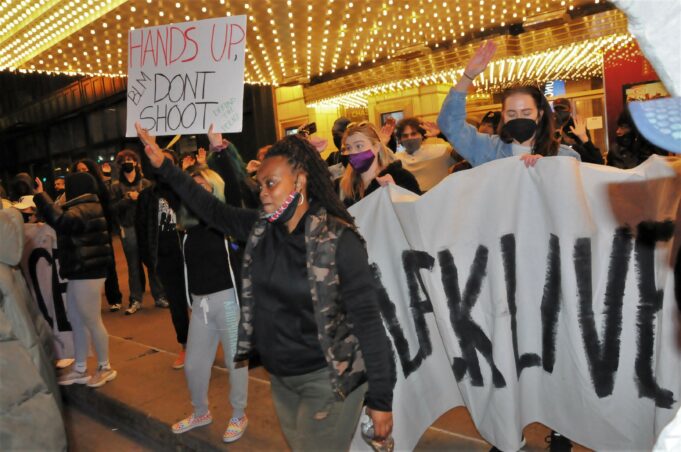New revelations from a recent study show American police killings have been undercounted by more than half over the past four decades. This news is the latest evidence of a continuing pattern of racism and violence in the law enforcement system that now implicates medical examiners and questions the lack of credible national record keeping.
“America doesn’t want to face the reality of its law enforcement departments,” Matthew Fogg, retired U.S. Marshal told The Final Call. “All of this has come out since the George Floyd murder. His murder was wrongly attributed to drug use by the medical examiner. It’s a pattern and practice of misrepresenting the truth,” he argued.
“It’s the way this country is operated when it comes down to law enforcement. We all work in tandem. Some are police, some are prosecutors, they work with the medical examiners, and the judges. Everybody’s in on it. I learned that in my 30 years of dealing with this system on every level. I began to see it myself with my own eyes.”
Researchers at the University of Washington compared information from the National Vital Statistics System (NVSS), which collects death certificates, with recent data from three organizations that track police killings through news reports and public records requests.
They analyzed that data and found a startling discrepancy: about 55 percent of fatal encounters with the police between 1980 and 2018 were listed as another cause of death. Across all races and states in the U.S., the report estimated 30,800 deaths from police violence during that time period. Federal official reports documented only 13,700 deaths from police killings.
However, the researchers found an additional 17,100 more deaths by police killings. For police killings of Black Americans, the undercounting was also significant, with 5,670 deaths missing, from official federal statistics, out of an estimated 9,540 total deaths. The researchers published their findings in September in The Lancet, a major British medical journal.
“In IHME’s (Institute for Health Metrics and Evaluation at the University of Washington) recent paper on fatal police violence by race, ethnicity, and state in the United States, we found that Black Americans were three and a half times more likely to be killed by the police than White Americans,” said Eve Wool, M.P.H., one of the study authors, in a video statement.
“Indigenous and Hispanic Americans were twice, almost twice as likely to be killed by the police than White Americans. Police violence against Black people was higher every year, 1980 to 2018 than it was for White people in the United States.”
Since 1980, this racial disparity has remained largely unchanged,” Ms. Wool explained. “All of these statistics really outline the systemic racism that is driving police violence in the U.S. and police violence is a public health issue. Violence is a public health issue and systemic racism is a public health issue,” She added.
“I think the big takeaway is that most people in public health tend to take vital statistics for the U.S. and other countries as the absolute truth, and it turns out, as we show, the vital statistics are missing more than half of the police violence deaths,” Dr. Christopher Murray, Institute for Health Metrics and Evaluation’s director, told the media.
“You have to look for why those deaths that are being picked up by the open-source investigations, looking in the media and elsewhere, aren’t showing up in the official statistics. That does point to the system of medical examiners and the incentives that may exist for them to want to not classify a death as related to police violence,” he added.

The researchers raised red flags over “substantial conflicts of interest” that “could disincentivize” accurate recording by medical examiners. Many times, medical examiners are employees of the police department. In rural and small-town America, sheriffs wear two hats with the other being the coroner.
“Currently, the same government responsible for this violence is also responsible for reporting on it,” warned study co-lead author Fablina Sharara. Suggesting reform, the study authors advise that “forensic pathologists should work independently from law enforcement” and be “awarded whistleblower protections under the law,” to liberate them from pressure to downplay police violence.
Dr. Roger Mitchell Jr., a former chief medical examiner in Washington, D.C., and an expert on investigating deaths in custody has repeatedly said that death certificates should include a checkbox indicating whether a death occurred in custody, including arrest-related deaths as well as those in jails and prisons.
He explained to the media that as long as medical examiners are not specifically asked to include that information, he would not jump to conclusions about why they do not do so. “If it’s a function of training, a function of bias, a function of institutional and structural racism—all the things we can assume—we can identify that once we have a uniform system,” Dr. Mitchell said.
What we do know is that repeated undercounting exists at higher rates for Blacks killed by the police than anyone else. Medical examiner results determine whether criminal charges are brought against officers involved in killings.
Dr. Mitchell joined a group of medical examiners that wrote an open letter to the U.S. Justice Department, CDC, and Maryland’s State’s Attorney criticizing the testimony of Dr. David Fowler, Maryland’s chief medical examiner. He testified on behalf of Derek Chauvin, the Minneapolis police officer convicted of murdering George Floyd, saying his death was caused by several factors and was not a homicide.
“Our disagreement with Dr. Fowler is not a matter of opinion. Our disagreement with Dr. Fowler is a matter of ethics. The disingenuous testimony of Dr. David Fowler exposes the frailty of the current Medical Examiner/Coroner System and illustrates the lack of existing oversight and uniformity of practice. If forensic pathologists can offer such baseless opinions without penalty, then the entire criminal justice system is at risk,” the letter read.
The Institute for Health Metrics and Evaluation study found that while racial disparities in other health outcomes like heart disease were narrowing, the racial gap for police killings has grown since 2000.
“Systemic racism is ubiquitous throughout the United States. Police brutality, excessive force against African Americans by the police are some of many manifestations of that,” Boston attorney Hakeem Muhammad told The Final Call. “There’s a real agenda to deny racism, to deny the fact that police act as aggressors within the Black community. There’s a real movement to absolve police of wrongdoing against African American communities,” he added.
“The more that these deaths are revealed, the more that people mourn over the deaths of Black people who have been killed by the police, that it further delegitimizes the police in the eyes of Black people. It gives more credibility to Black protest movements and Black movements who have been at the forefront and fighting against police brutality,” he added.
The Institute for Health Metrics and Evaluation study is a collection of data without names and faces. Behind it are the real-life cases of medical examiners or coroners who omitted the role of the police in the death of Black men. Black men like Elijah McClain from Aurora, Colo. His death was ruled undetermined after the police put him in a chokehold and paramedics injected him with the powerful sedative, ketamine. Nearly two years later, after protests, three officers and two paramedics were indicted for his death.
Behind it are Black men, like Ronald Green from Louisiana, whose death was classified by the coroner as due to cardiac arrest and classified as accidental. That was until video surfaced of him being stunned, put in a chokehold, beaten and dragged by state troopers.
The Honorable Minister Louis Farrakhan of the Nation of Islam has taught, cautioned and warned for decades about the targeting of Blacks by American law enforcement and the collusion in other areas that magnify the problem. “I know that there are police in every city that try to do their jobs, but I also know that there are police in every city that are rogues, who use their badges and their authority as a license to kill,” the Minister stated during his 2015 message titled “America’s Treacherous Betrayals of Her Slaves and Ex-Citizens,” leading up to Justice or Else!, the 20th anniversary gathering of the Million Man March.
“I say this very humbly: This has reached the point of explosion. I have pleaded with the government of the United States of America to do its job. We are supposed to be living in a civilized society; We are not supposed to take vengeance when someone does evil to us; that’s what government is supposed to do so that the society remains civil. But when the government fails … . When liars are judges, when liars are medical examiners, when liars are prosecutors, when liars are district attorneys, when liars allow murder to go on, and we go home grieved—and the murderer goes home to dinner with his family, when our women are beaten and killed while under detention, how long can we as a people endure such without responding appropriately when government fails to act?” the Minister asked.
“There is both historical and contemporary problems with the relationship between our community and law enforcement to such a degree that there needs to be a complete overhaul of it and consider solutions like Minister Farrakhan proposed back in the 1970s after the police raided our mosque in New York,” Demetric Muhammad, author of “How to Police the Black Community,” told The Final Call.
“The Minister said that White officers should not be permitted to police in Black neighborhoods. There is something to be said for having a cultural awareness and an appreciation for the people in the communities where police officers work. Whereby, if you do not have cultural awareness, or an appreciation for the people and all of the nuances, peculiarities and idiosyncrasies that take place in a given neighborhood, if you’re unfamiliar with that, then there is a vacuum in your understanding of the people that you have pledged to serve. That translates into a vacuum in your approach to policing,” said the Memphis-based Nation of Islam student minister.
Mr. Muhammad recalled a quote by Darren Wilson, the police officer who killed Mike Brown in Ferguson, Missouri. “Darren Wilson said he enjoyed policing in Black neighborhoods because that was where ‘the fun was.’ In Ferguson, St Louis, Chicago, Memphis, D.C., everywhere, that we call the ‘hood, these places are economically distressed, there’s a lot of crime, violence and drug use. What was Officer Wilson referring to as fun?” he asked.
“Could it be that being a young White officer, never having had any real organic interaction with the Black community, and now being tasked with policing in a ‘bad community,’ that the only concept he had about Black people in his mind was from Hollywood, from movies, from popular culture? That created a perception some people now refer to as bias whereby you come in with a certain view of the people in that neighborhood.”
Mr. Muhammad explained that White officers seemed to be more willing to shoot first and ask questions later. Also is the fact that officers are rarely convicted for killings.
“We need to have something on the line of ethnic enclaves, where our people and people who love our people are doing the policing,” said Mr. Muhammad. “Otherwise we continue to get, what we have.” Final Call staff contributed to this report.













